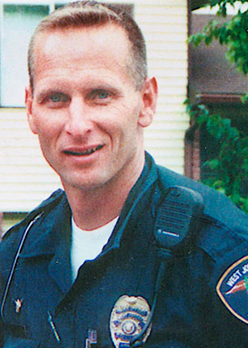
Haunted by the deaths of friends in uniform, a West Jordan detective collapses under his grief and guilt. As he searches for relief, he worries: Could seeking help cost him his job?

Detective Brent Jex's eyes shot open, and he struggled to pull in a deep breath. A perp was pulling a trigger. Or a baby was suffocating. Or he was trapped in a dark corner as a shadowy menace walked toward him. Night after night, he jolted awake in a panic. As his heart rate slowed, he would wonder: Was that a nightmare? Something that had really happened? Or both?
He knew one thing for sure: The job he loved was getting to him.
Exhausted and hoping to regain his old confidence and composure, Jex tried exercise. Nearly every day, he strained against heavy weights in the police academy gym. He dropped a few pounds. But the compulsive workouts only left him more tired, more on edge.
In his family's kitchen one October morning in 2014, Jex snagged a yellow blender bottle to make a protein drink. He unscrewed its lid, looked inside and slammed it down on the counter.
"Why can't I ever find the shaker?!" he yelled. "Who is taking it out of the bottle?"
His teenage daughter, standing near the living room, fessed up. The container's bright color was cute, Lynn thought, and she had used it the day before as a water bottle. She just forgot to put the shaker ball back.
Jex screamed: "It is not a water bottle!"
The intensity of his anger shocked her.
Jex considered Lynn his angel, a respectful young woman who had never really rebelled. But now he was haranguing her, telling her to go buy her own water bottle if she wanted one, to keep her hands off his property. She started to cry and before her father finished, she bolted up the stairs to her bedroom, slamming the door shut.
Jex scooped protein powder into the cup, catching the "What the hell was that?" look on his wife's face. He mumbled something to Katie about how he had to go to work and he walked out.
As he left the house, he feared his marriage was over.
For the past month, he'd been withdrawing from his wife, believing that Katie had grown tired of him. He couldn't blame her. He knew he had become increasingly difficult to live with, and he knew he had overreacted about the shaker bottle. But his hollering had felt uncontrollable and that scared him. He assumed it scared Katie, too. When he came home after his shift, he wondered whether she had changed the locks, but his key still worked.
In the days that followed, Katie would prod him to work on their half-remodeled bathroom, but Jex wouldn't budge. Why should he fix it when his family was about to fall apart? Let her next husband handle it.
He began searching online for a decent mobile home park, envisioning a shabby existence in the family's travel trailer, where he'd survive on ramen noodles and macaroni and cheese because Katie surely would demand sky-high alimony and child support. He already resented her for it.
At the time, Jex was 40 years old and a 16-year veteran of the Police Department in West Jordan, a fast-growing suburb of Salt Lake City. It's a middle-class area but has enough drug traffic and gang crime to keep a cop busy.

Brent Jex is a West Jordan narcotics detective and the president of the Utah State Fraternal Order of Police.
Photo by Scott Sommerdorf | The Salt Lake Tribune
Jex is built like a bulldog, with a deep voice and piercing eyes under a big brow. He's imposing even when he's trying not to be. He's spent much of his career on the Salt Lake City area's gang unit and with an elite group that hunts dangerous felons. Most recently, he's worked as a narcotics detective, going undercover to bust dealers and occasionally their suppliers. That means assuming another identity and being good at it.
Jex thought he could pull the same trick around his friends, family and fellow officers. He'd just act like his old self. No one would realize that he felt confused and angry, fighting mood swings and insomnia.
It didn't work. His struggles soon were noticed by his friends in blue.
Jex serves as the president of Utah's Fraternal Order of Police, the main organization representing cops in a state with little union tradition. The state FOP has 3,300 members, and Jex has made friends in dozens of police departments. On Oct. 15, 2014, shortly after the water-bottle meltdown, Jex carpooled with an FOP brother to a meeting in Ogden. On the drive, his friend asked what was wrong. Jex dodged the question. The Bountiful officer pushed, but Jex still said nothing. Finally, his friend pulled into a parking lot, turned off the truck's engine and refused to move until Jex spilled. They ended up talking for hours. In the end, Jex agreed it was time to confide in his wife.
Since his training at the police academy in 1998, he had tried to shield his family from his police work. He didn't tell stories about chasing dangerous men around dark corners or about the times they'd come at him, punching and kicking. He didn't talk about the suicides or the terrible things that being in a mangled car can do to a human body.
The only time Katie heard about any of it was at parties, when other officers started telling tales. Those were usually the funny cases, with any troubling details tidied up for a good laugh.
Jex summoned the courage to talk to his wife the next night after work. He gently woke her and said he had something to say. She angrily told him to leave her alone because she had to get up at 4:30 a.m. Wounded, he stormed off.
Katie had spent the previous two months on edge, wondering whether he'd be angry or just quiet when he came home. She wasn't afraid her husband would do anything violent, and neither were their two children. But after weeks of giving him space, her patience was nearly gone.
From Katie's perspective, Jex's unpredictable moods had started in September, when he sent a text out of nowhere: "I feel like we are growing apart." Before that, she thought their marriage was strong. That water-bottle episode? She didn't think anything of it and can barely remember it. And even after the text, she blamed her husband's behavior on the stress of a major drug case.
The next day, Katie felt a little sheepish about snapping at him. She texted an apology and suggested they could talk later that afternoon. When Jex got home, their daughter was at work and their son was distracted by video games. Jex made a snippy remark to Katie, who was cleaning, then marched into their basement bedroom. He slumped into his brown La-Z-Boy recliner in the corner, his personal domain, where he could watch TV or goof around on the internet. If he had one safe space in the house, this was it.
She followed, asking: "What is going on?"
"Oh, now you want to talk? I wanted to talk to you yesterday," he said.
"Well, you've got my attention now." She took a seat on the edge of their bed.
Over the previous two days, he'd considered what he'd say. He'd start by admitting he was struggling and then go over the old cases that plagued him in detail.
When he actually started talking, though, he got out only a few words before he was hit by an emotional tidal wave. Tears rushed down his cheeks. He tried to speak between sobs but couldn't. He saw the fear and surprise in his wife's reaction. He was afraid, too. What was happening to him?
Katie remembers standing up and closing the bedroom door, worried their son might wander down to the basement. Then she sat back down. She was so in shock that her mind went blank.
Jex took a minute to gain his composure. Finally able to speak, he wiped his face and said, "This is stupid."
In a smaller, gentler voice, Katie tried again. "What's going on?" Jex looked into her eyes and croaked: "Ron."
Nearly 12 years earlier, on Nov. 18, 2002, West Jordan traffic cop Ronald Manfred Wood had been ambushed and shot in the head by a troubled teenager named Justin Van Roekel.

Officer Ron Wood
Photo from the West Jordan Police Department
Jex was 500 miles away at a training course at the time, yet he felt responsible. He had Justin in handcuffs three days earlier, but when the teen calmed down, he took them off, ignoring a gnawing feeling that the kid was dangerous. Justin bolted, and the police couldn't find him — until Wood did. As Jex's guilt mingled with his tears, Katie comforted him, but she also had a hard time understanding. She knew Wood's killing had deeply affected her husband, but for him to blame himself over and over for a dozen years while keeping his anguish bottled inside until he couldn't function — it shook her.
Her heart almost burst when he begged: "Don't leave me."
Getting a divorce had never crossed her mind. Not once.
"It was horrible to watch him … the rock, crumble," she said.
She'd been to the funerals of police officers who had taken their own lives, and she now worried Jex might kill himself. He assured her that he wasn't "to that point," but he wasn't too convincing. In the weeks that followed, she'd text him constantly and hold her breath until he answered. They'd hunt online for a diagnosis and act as if nothing was wrong around their friends.
One obvious option — counseling — held a stigma so strong that Jex refused to seek help until his health was in tatters. A cop who talks to a therapist, who dares to say he or she needs help, is damaged and not to be trusted.
Today, Jex sees that stigma as ridiculous and dangerous.
He believes his story illustrates ways police officers often hide their emotional scars, and shows the widespread need to confront the damage a career in law enforcement can do to a person. If more officers received help, he believes, lives would be saved. There would be fewer suicides, fewer violent confrontations with suspects.
He wants his fellow officers to learn from his journey, which began in the days before Officer Ron Wood chased an increasingly desperate teenager into a city park.
Mental health resources
Learn about the Utah Fraternal Order of Police Mental Health Program.
See DunamisPolice.org's page about trauma and mental health.
Find help for anyone experiencing suicidal thoughts at 1-800-273-TALK (8255). Utah also has crisis lines statewide.
The SafeUT app offers immediate crisis intervention services for youths and a confidential tip program.





